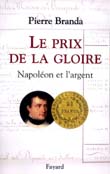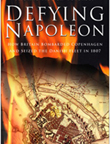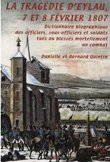| |
| |
For 2007, the Fondation Napoléon's annual HISTORY PRIZES for works of history on the two French empires have been awarded to the following authors:

|
|
|
| |
 |
 |
FONDATION NAPOLEON GRAND PRIX AND FIRST EMPIRE PRIZE 2007
Pierre Branda, Le prix de la gloire, Napoléon et l'argent, Editions Fayard
With his greatcoat and his hat, Napoleon passes for a simple man, not in the least influenced by “filthy lucre”. And yet, money was the emperor's constant companion. To forget this is to forget that the French Revolution, to which Napoleon owed everything, was the direct consequence of a financial crisis which the Ancien Régime was unable to solve. To forget this is to forget that the devaluation of paper money was one of the principal factors for the Directory's discredit, which itself favoured the arrival of a man able to re-establish order. To forget this is to forget that the military expeditions planned or led by Bonaparte (Italy or Santo Domingo) were organised for economic reasons or failed for serious lack of funds (Egypt). Such amnesia however would also unjustly minimise the consular regime's contribution to the re-establishment of national finances. It would be to forget the extraordinary feat performed by Napoleon of financing fifteen years of war without bankrupting the state, when twenty years earlier French assistance in the American war of Independence, on a relatively modest military level, had brought a thousand-year-old French monarchy to its knees.
Read the interview with Pierre Branda.

|
|
|
| |
 |
 |
PRIZE FOR A BOOK IN A LANUGUAGE OTHER THAN FRENCH 2007
Thomas Munch-Petersen, Defying Napoleon, Sutton Publishing
In the later summer of 1807 a new era of British international politics dawned with the aggressive bombing of Copenhagen by British forces. This book by Thomas Munch-Petersen, senior lecturer in Scandinavian History at University College London, UK, is one of the first ever monographs in English on the subject. It deals in detail with the Anglo-Danish diplomatic wranglings which preceded the show of force, Danish relations with France and finally the bombardment itself. The book is based on extensive original research in British and mainly Scandinavian archives and offers new evidence and interpretations. Most of all, it tells the story of Napoleon Bonaparte's “ferocious will”, Alexander I's “devious and nebulous ambitions” and George Canning's “determination” at the time of this famously unprovoked aggression against a neutral state and the terror bombardment of a civilian population.

|
|
|
| |
 |
 |
SPECIAL JURY PRIZE 2007
Bernard and Danielle QUINTIN, for their lives' work:
- Dictionnaire des colonels de Napoléon (1996, Editions SPM)
A biographical dictionary of 1,574 colonels and adjudants commandants in service during the First Empire. It details their regiments, their provenance (social and military), their promotions, their subsequent history after the fall of the empire, their parliamentary roles, their distinctions, their deaths and gravestones.
- Dictionnaire des capitaines de vaisseaux de Napoléon (2003, Editions SPM)
A biographical dictionary of 194 capitaines de vaisseaux (ship's captains) in the French navy during the First Empire. Includes tables giving geographical origin and gives details concerning their professions, their political roles, their distinctions, sanctions, etc. The work opens with an exceedingly useful prosopographical study.
- Austerlitz, 2 décembre 1805 : dictionnaire biographique des soldats de Napoléon tombés au champ d'honneur (2004, Archives et Cultures Editions)
A biographical dictionary of the 1,057 French officers, NCOs and rank and file killed or mortally wounded at Austerlitz.
- Dictionnaire des soldats français morts à la bataille d'Eylau (2006, Archives et Cultures Editions)
This work begins with a resumé of the Polish campaign in January and February 1807, giving totals for the forces present and the various phases of the battle of Eylau. It then continues with a biographical dictionary of all the soldiers in the Grande Armée killed at Eylau giving date and place of birth, the circumstances of their death and their military career. Included amongst the many appendices is an index of those killed at Eylau arranged by département. The work is intended as a homage to the memory of those Frenchmen who gave their lives for the victory at Eylau.

|
|
|
| |
RESEARCH GRANTS 2007
Every year, grants are awarded to students beginning PhDs on First or Second Empire subjects. This year the following research projects were supported:
First Empire
• Eman Vovsi, The forgotten Napoleonic code: the Code Militaire
supervised by Rabe Blaufarb, Florida State University, Tallahassee (Florida)
• Cyril Lecosse, Jean-Baptiste Isabey (1767-1855): the artist and his times,
supervised by Professor Philippe Bordes, Université Lyon II
• Eléonore Pahlavi, Britain and French Emigration: joint projects for a restoration of the monarchy in France (1793-1814), supervised by Professor Jacques-Olivier Boudon, Paris IV Sorbonne
• Bernd Pappe, Jean-Baptiste Jacques Augustin,
supervised by Professeur Pascal Griener, Université de Neuchâtel (Suisse)
• Jean-Philippe Reyn, A municipality during the First Empire: Lyon, 1805-1815,
supervised by Professor Bruno Benoît, Université Lyon II
• Leïla Saada, The First Consul's participation in the preparatory work for the Code Civil, supervised by Professor Alain Desrayaud, Université Paris XII
Second Empire
• Marie-Emilie Vaxelaire, Mellerio/Meller, the history of a Parisian jewellers in the 19th century, supervised by Professeur Bruno Foucart, Paris IV – Sorbonne
The Fondation Napoléon Grand Prix and History Prizes 2007 will be awarded on 19 November, at a lunch in the presence of HIH the Princess Napoléon.
For further information concerning the prizes, please email us.
Interested in the work of the Fondation Napoléon? Why not participate, either generally or in a specific project, by making a donation.
© this Napoleon.org bulletin is published by the Fondation Napoléon. Reproduction or all or part of this bulletin is forbidden, without prior agreement of the Fondation Napoléon.

|
|
|
|
|
|
|
|
|
|
The Fondation Napoléon Grands Prix, the fruit of the generosity of the industrialist, Martial Lapeyre, are awarded by a jury composed of the following specialists:
• Victor-André Masséna, Prince d'Essling (President)
• Jean-Claude Lachnitt (general secretary)
• Anne Muratori-Philip
• Gabriel de Broglie, of the Académie Française, and Chancelier of the Institut
• Jean-Marie Rouart, of the Académie Française
• Jean Favier, of the Institut
• Professor Jean Tulard, of the Institut
• Professor Jacques-Olivier Boudon, president of the Institut Napoléon
• Professeur François Crouzet
• Professeur Bruno Foucart
• Jacques Jourquin, vice-president of the Institut Napoléon
• Docteur Jean-François Lemaire
Four Grands Prix, each of 8,000 Euros, are awarded. Of these four prize-winners, the jury then chooses the overall winner, the “Grand Prix de la Fondation Napoléon”, awarding a further 7,000 Euros.
=> click here for the previous winners.
Furthermore, the same jury awards awards six research grants worth 7,600 Euros to six French or non-French students in the first year of their PhD (or MPhil intending to go on to PhD) on First or Second Empire subjects.
=> click here for the previous research grant winners.
<<
|
|



